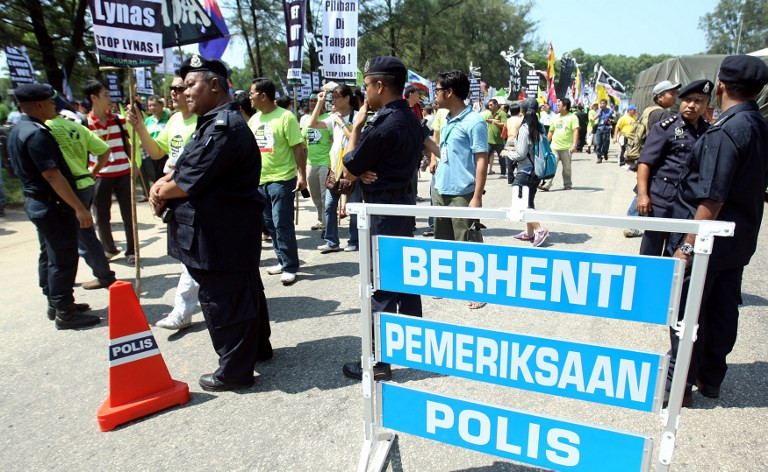Popular Reads
Top Results
Can't find what you're looking for?
View all search resultsPopular Reads
Top Results
Can't find what you're looking for?
View all search resultsMalaysia is latest in Asia to tighten grip on key minerals
Rare earths are a group of 17 elements used in products from lasers and military equipment to magnets found in electric vehicles, wind turbines, and consumer electronics, such as smartphones.
Change text size
Gift Premium Articles
to Anyone
 Malaysian police (in foreground) stand guard during an "Occupy Balok-Gebeng" rally against Australian miner Lynas Corporation in Kuantan, some 260 kilometres east of Kuala Lumpur, on June 24, 2012. Hundreds of activists protested against the Australian miner, who built a rare-earths plant in eastern Malaysia. (Agence France Presse/STR)
Malaysian police (in foreground) stand guard during an "Occupy Balok-Gebeng" rally against Australian miner Lynas Corporation in Kuantan, some 260 kilometres east of Kuala Lumpur, on June 24, 2012. Hundreds of activists protested against the Australian miner, who built a rare-earths plant in eastern Malaysia. (Agence France Presse/STR)
M
alaysia will develop a policy to ban exports of rare earth raw materials to "avoid exploitation and loss of resources", its prime minister said on Monday.
Rare earths are a group of 17 elements used in products from lasers and military equipment to magnets found in electric vehicles, wind turbines, and consumer electronics, such as smartphones.
The minerals are not uncommon in the earth's crust, but deposits that are economically viable are more scarce. Separating them into the materials needed to produce permanent magnets used in critical products is also a complex process.
Following are steps taken, or announced, by some Asian countries.
Malaysia
The Southeast Asian country's reserve of rare earth minerals of 30,000 metric tons is only a fraction of the world's supply and much smaller than the biggest source China, with an estimated 44 million tons of reserves.
But Monday's move is the latest by a country to restrict exports of key mineral resources.
Australia's Lynas Rare Earths Ltd, the biggest producer of rare earths outside of China, has a plant in Malaysia to process concentrate that it gets from Australia.
Malaysia has imposed restrictions on some of Lynas' operations, citing concerns about the radiation levels from cracking and leaching, which Lynas has disputed.
It was not immediately clear which exact rare earth product Malaysia's ban would target.
Myanmar
In Myanmar, mines in the Pangwa region of Kachin State, the country's biggest source of rare earths, have been closed for inspections since Sept. 4 for an unspecified period, causing a short-term supply worry.
Myanmar accounted for 4 percent of global rare earth mining output last year with output of 12,000 tons of rare-earth-oxide equivalent.
Tin mining in a major producing region in Myanmar was also suspended earlier this year.
Indonesia
Indonesia has banned nickel ore exports since 2020 in an effort to maximize revenues through downstream processing of the mineral used in stainless steel and electric vehicle batteries.
Another major nickel producer, the Philippines, in January was looking at taxing nickel ore exports to encourage investment in the downstream sectors within the country.
China
In July, China announced restrictions on exports of gallium and germanium, two minor metals used to make semiconductors, prompting fresh worries that Beijing could potentially limit exports of other materials, notably rare earths.
China accounted for 70 percent of world rare earths mining output in 2022, while it has a share of 85 percent-90 percent of processed rare earths and magnet production.
In 2010, China restricted exports of rare earths to Japan following a territorial dispute, although it cited environmental concerns at the time.
Japan, the European Union and the United States successfully challenged China's action at the World Trade Organization.
The episode led Japan, which had relied on China for virtually all of its rare earths, to seek alternative suppliers. It invested in Lynas and had reduced the share of its imports of rare earths from China to 58 percent by 2018.
China has a quota of rare earth production.










